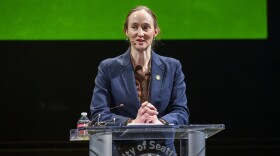Democratic U.S. Rep. Pramila Jayapal of Seattle raised strong objections Tuesday at a Congressional hearing in Washington, D.C., about e-commerce taxation.
A House Judiciary subcommittee has before it a Republican-backed proposal to block states from demanding sales tax when online shoppers buy something from an out-of-state merchant.
"This bill could result in billions of lost revenue for our state, which would hurt our ability to pay for critical goods and services including education, construction and emergency responders, among other things,” Jayapal said during the hearing.
The newly approved Washington state budget relies in part on an expanded online sales tax. Jayapal's opinion was in the minority at the hearing. Republican subcommittee members and several witnesses said online businesses need protection from what they characterized as an "onslaught" of state sales tax regulations.
"They need help from Congress to ensure that we don't kill the next Amazon or Facebook or eBay before it even gets started," added Steve DelBianco, executive director of a trade association for internet companies called NetChoice, in a statement.
The bill sponsored by Rep. James Sensenbrenner, R-Wisconsin, and Judiciary Committee Chairman Bob Goodlatte, R-Virgina, would essentially update and codify a 1992 U.S. Supreme Court decision, Quill v. North Dakota, which said a state cannot require businesses to collect sales taxes unless the business has a presence in that state.
A package of tax increases approved by the Washington Legislature in the past month includes a provision requiring online retailers and marketplaces nationwide to either collect the state sales tax or provide the state a list of the names, addresses and purchase amounts of Washington customers so the tax collector can bill them.
A preliminary estimate from the Washington state Department of Revenue predicted that the online sales tax expansion would net an additional $1 billion over the next four years.
The prospects for Sensenbrenner's proposal, titled the "No Regulation Without Representation Act of 2017," are unclear. Several other measures addressing the same topic have been referred to the House Judiciary Committee but not scheduled for a hearing. Some of these would create an avenue for states to collect sales taxes on cross-border e-commerce.
Until now the collision of powerful competing interests—states feeling pain from sales tax erosion, brick-and-mortar businesses who complain about an uneven playing field with untaxed online competitors, anti-tax sentiment channeled by groups such as the National Taxpayers Union and reluctance to interfere with the growing internet economy—has stymied any momentum on Capitol Hill to act.
Copyright 2017 Northwest News Network








